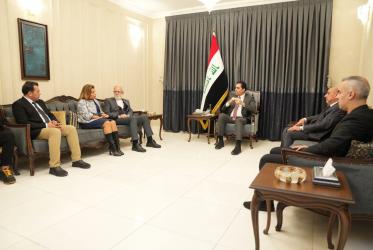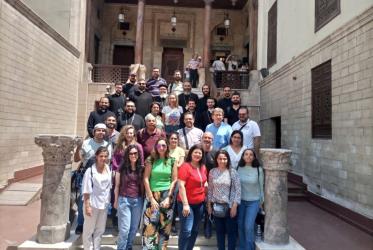Your Holinesses,
Your Beatitudes,
Your Eminences and Graces,
Dear Reverend Fathers and Pastors,
Dear Sisters and Brothers in Christ,
It is an honour and a privilege for me to be among you representing the World Council of Churches (WCC) and its general secretary, the Rev. Dr Olav Fykse Tveit, at your 11th assembly. We are very pleased to see that the many partners who have accompanied you in your efforts are present here to manifest their solidarity and renew their commitment in supporting the Middle East Council of Churches (MECC) in its new programmatic work. This gathering, where all heads of churches in the region came to witness and act together, is not only a sign of the rebirth of the MECC but also and especially a strong sign of hope for the Christians in the region and beyond.
Indeed, you have chosen as a theme for your assembly a hymn calling us to always “give thanks to the Lord for He is good, and His mercy endures forever” (Psalm 136: 1). In fact, the ecumenical family has a lot to learn from the Christians in this region. Despite the difficult historical moments that the whole region is going through –probably as Christians we should say, because of these tragic moments- Christians continue to keep hope alive in what seems to be for many hopeless situations. The hope you hold in your daily lives is rooted in your faith in the living God, who is good and merciful to all God’s creation. Your Christian hope does not lead you into illusions because you are able to see God and praise God in the midst of trouble, and you continue to be co-workers for transformation with the Holy Spirit who is dwelling among us, and guiding our steps. Christians in this region manifest their hope by remaining steadfast and by working to change and transcend the different realities in which they live. Your common witness together during this assembly is but one sign of hope. The so many living parishes and congregations, the vibrant monastic communities, your theological faculties and universities, your hospitals, schools and humanitarian services are essential parts of your creative and continuous witness of the hope you hold in the loving God for all, offering spiritual resources to all people in the region and beyond.
During the 10th WCC assembly in 2013 in Busan, our fellowship of churches committed themselves to journey together in a pilgrimage for justice and peace. In the WCC we have dedicated this year, 2016, to focus on justice and peace in the Middle East region, so that the presence and witness of the Christians is strengthened for the good of all. We do this in close cooperation with our member churches in the region and in coordination with our privileged partner, the MECC.
We are all fully aware that the challenges facing us are immense as the region is going through an unprecedented turmoil. This requests from all of us a thorough and common reading of “the signs of the times” in light of our biblical, theological and ethical imperatives as they are relevant here and now, in our own context. The premises of what the region has witnessed, in terms of strong demands for liberation, freedom, democracy, human dignity, equal citizenship, social and economic justice, should be analysed deeply and not be dismissed or be buried under the carpet. It is not because they have been quickly undermined by the rise of religious extremisms and the perpetuation of occupation and the maintaining of the present regimes that these legitimate demands are no longer valid. As it has been stated on different occasions by the WCC governing bodies, all the peoples in the whole region deserve a third alternative that allows them to live in security and enjoy their freedom and human dignity at the same time. We believe this should be our common task in the region as well as in the global ecumenical movement.
In our discernment to seek the way of God’s justice and peace in the region, we are guided by your historical experience, where you were able to manifest the love of God toward all your neighbours and toward God’s whole creation. We are also guided by our faith that sees God’s image and likeness in every human being, and therefore we consider the right of all people to live in dignity and freedom as a fundamental right. These same imperatives and principles call us to stand in solidarity with the needy, the oppressed and with those who are struggling for liberation from occupation.
The tasks and responsibilities ahead of us cannot be addressed individually. Having experienced myself the pain of apartheid in South Africa, I have learned to value the solidarity of the ecumenical family, without which we wouldn’t have been able to liberate our societies from hatred and injustice, and walk together in the way of truth and reconciliation that will lead us to justice and peace. I am fully confident that by coming together, the churches in the region, with the faithful accompaniment of the whole ecumenical family, will find new ways of collaboration with all people of good will so that justice and peace will prevail, together with the dignity of every human being.
May our merciful God bless your assembly and your coming together, and accompany you in your pilgrimage of justice and peace.
Prof. Dr Isabel Apawo Phiri
Associate general secretary for Public Witness and Diakonia
World Council of Churches


